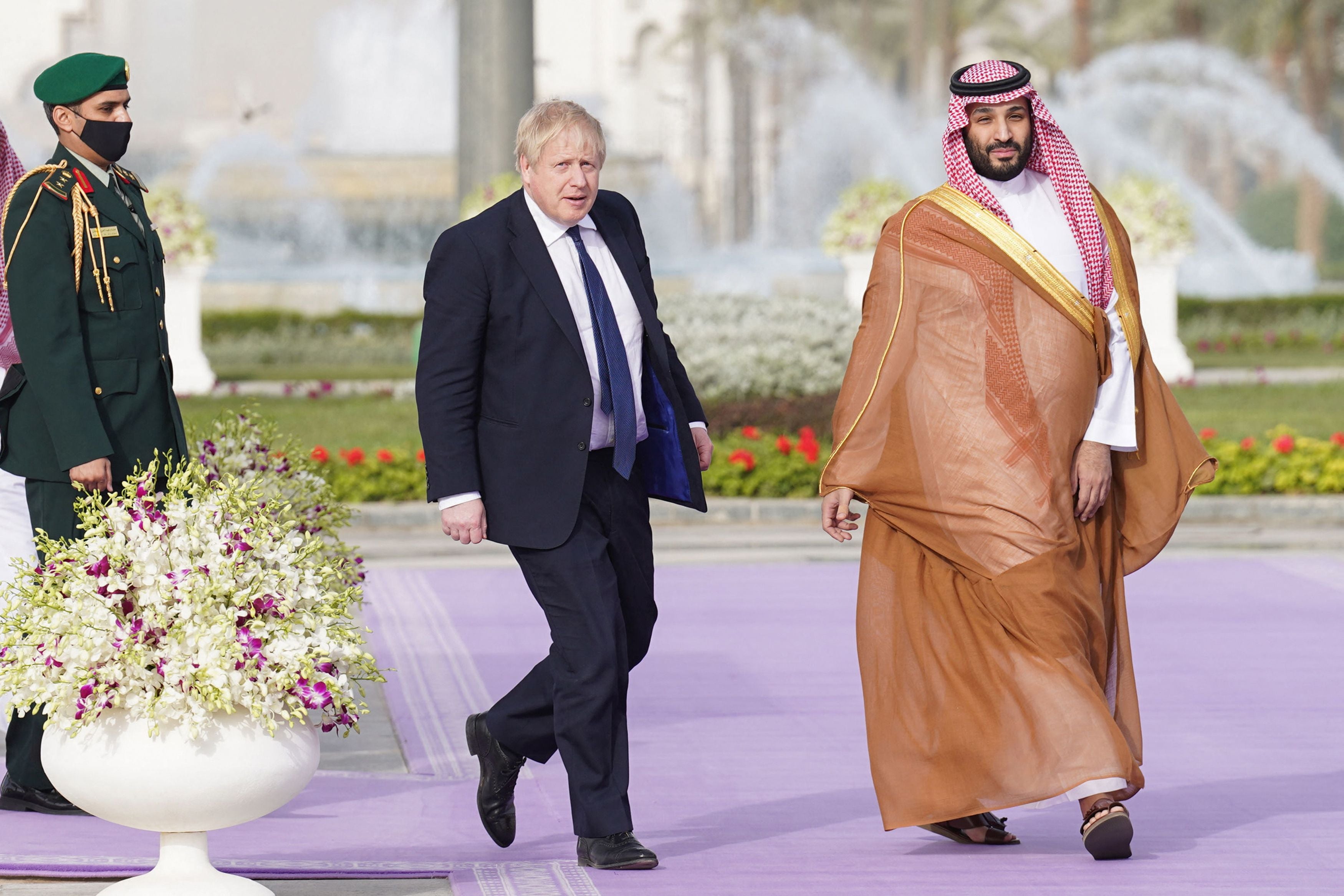Boris Johnson fails to secure promise of more Saudi oil in visit overshadowed by executions
‘Understanding’ in desert kingdom that economic instability not in their interests, says PM

Your support helps us to tell the story
From reproductive rights to climate change to Big Tech, The Independent is on the ground when the story is developing. Whether it's investigating the financials of Elon Musk's pro-Trump PAC or producing our latest documentary, 'The A Word', which shines a light on the American women fighting for reproductive rights, we know how important it is to parse out the facts from the messaging.
At such a critical moment in US history, we need reporters on the ground. Your donation allows us to keep sending journalists to speak to both sides of the story.
The Independent is trusted by Americans across the entire political spectrum. And unlike many other quality news outlets, we choose not to lock Americans out of our reporting and analysis with paywalls. We believe quality journalism should be available to everyone, paid for by those who can afford it.
Your support makes all the difference.Boris Johnson has failed to secure commitments from Saudi Arabia to step up oil production to ease cost-of-living pressures, on a visit that was overshadowed by the announcement of three further executions in the desert kingdom.
The prime minister said he had obtained an “understanding” from the Saudis that instability in world markets from a spike in energy prices caused by the Ukraine war was not in their interests.
But asked whether he had secured assurances that the oil-rich Gulf state would turn on the taps, he could say only that it was a decision for them.
“I think there’s certainly an understanding that there’s an interest for Saudi Arabia – for all oil-producing and exporting countries – in making sure that the global economy is not damaged by the current spikes, that we don’t get the kind of inflation that we saw in the 1970s, we don’t see the stagflation,” he said.
“So it was a very productive conversation.”
Asked if this meant an agreement had been reached, he replied: “I think you need to talk to the Saudis about that, but I think there was an understanding of the need to ensure stability in global oil markets and gas markets and the need to avoid damaging price spikes.”
Mr Johnson faced criticism for meeting crown prince Mohammed bin Salman on a one-day trip – also taking in the United Arab Emirates – just days after Saudi Arabia announced the mass execution of 81 people on Saturday.
Labour deputy leader Angela Rayner accused him of “begging” one dictator to bail him out after another had thrown his energy plans into disarray.
And the furore was heightened when the state-run Saudi Press Agency said three more individuals had been executed while Mr Johnson was there.
Maya Foa, the director of human rights advocacy group Reprieve, said: “By travelling to meet Mohammed bin Salman so soon after a mass execution, Boris Johnson clearly signalled that in return for oil, the UK will tolerate even the gravest human rights abuses.
“Carrying out these executions while the leader of a western power is on Saudi soil was a provocative act, designed to flaunt the crown prince’s power and impunity to the world.”
Ms Rayner blasted: “Last week the leader of the opposition [Keir Starmer] said that Britain should never again be at the mercy of a foreign dictatorship for our energy and fuel security.
“This week, the prime minister has gone cap in hand from one dictator to another on a begging mission to the Saudi prince to bail him out.”
Mr Johnson said he had raised human rights with his hosts, and insisted that “things are changing in Saudi Arabia” and he would continue to engage with the Gulf kingdom.
“I think you can also see that – in spite of that news today – things are changing in Saudi Arabia,” he said.
“We want to see them continue to change. And that’s why we see value in engaging with Saudi Arabia and why we see value in the partnership.”
Mr Johnson said the crown prince had agreed with him that it was essential to see an end to Vladimir Putin’s invasion of Ukraine.
Speaking at a manufacturing facility in Riyadh after a meeting with the prince which lasted around an hour and 45 minutes, he said: “We discussed everything that you would expect, so I raised human rights, but we also talked about what we can do to stabilise oil prices, to fight inflation, to help consumers, to help people at the gas pumps, at the petrol pumps.
“A lot of agreement that it’s important to avoid inflation, to avoid the damaging economic consequences, an agreement that we need to work together to bring peace to Ukraine.
“We both agreed that we need to see an end to Putin’s war.”
Join our commenting forum
Join thought-provoking conversations, follow other Independent readers and see their replies
Comments